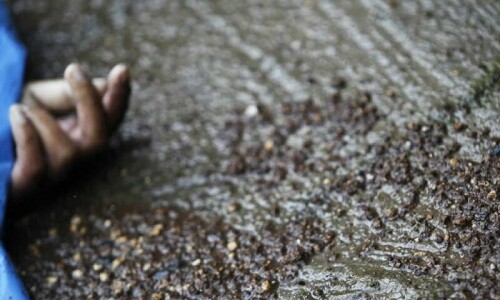JIFTLIK: While feeding his sheep pricey fodder, Palestinian farmer Talib Edais wistfully glanced at the hills where his herd used to graze for free. This was up until an Israeli decision, last month.
“Do you see these troughs? We had to sell some sheep to feed the others. Within a year, we will not have any sheep left,” the 65-year-old told journalists at his farm, in the village of Jiftlik, near the Jordan Valley in the occupied West Bank.
Israeli authorities declared 8,000 dunams (800 hectares), as state land in March. The land in question is adjacent to Edais’s home and is an area that includes his sheep’s grazing grounds. These moves often lead to restrictions placed on Palestinians’ access to the lands.
Israel has occupied the West Bank since 1967 and established settlements deemed illegal under international law and has for decades, seized land in the Palestinian territory.
According to Israeli settlement watchdog, Peace Now, this year has already broken a record for most ‘land grabs’, which often lead to the expansion of settlements.
The advocacy group revealed that 10,971 dunams of land in the occupied West Bank, have been seized by Israel, this calendar year. This has occurred as the world’s attention has been focused on the devastating Israeli assault on the Gaza Strip, which began on October 7. The previous yearly record, according to Peace Now, was 5,200 dunams seized in 1999.
When an area is declared as state land, it makes the Israeli government its owner. Technically, this should not affect farming or other uses of land, until the lot is reallocated for development or handed over to private owners.
However, Peace Now found in 2018 that “99.76 percent of state land allocated for any use in the occupied West Bank, was allocated for the needs of Israeli settlements”.
From the land near the Jordanian border that Edais and 50 of his relatives have resided on since 1976, the farmer can see the nearby settlement of Masua and an Israeli army base. Before the Israeli order to seize the land had even taken effect, he said settlers ‘captured’ his sheep, claiming the animals had entered an ‘off-limits area’.
To retrieve them, his family was made to pay 150,000 shekels (about $39,500), to the Jordan Valley Regional Council. This is an administrative body of about two dozen settlements, including Masua.
Rights groups have denounced the increasing use of such tactics, ‘encouraging’ Palestinian displacement from lands, yearned for by settlers.
The Israeli defence ministry body responsible for Palestinian civil affairs, COGAT, and the office in charge of state lands, did not respond to repeated requests by reporters for comment.
Hamad Audi, a 55-year-old construction worker living in Jiftlik, told reporters’, what happened to Edais, came as ‘no surprise’. “The law is in the hands of the settlers, and the state (Israel) stands with them,” Audi said.
According to him, plenty of houses in the village have been ‘handed’ demolition notices by Israeli authorities, with one already demolished.
In March, 206 dunams (51 acres) bordering Jiftlik, were declared as a state-owned archaeological site and placed under the authority of the Jordan Valley settlement council.
The area is a rocky mound, where a former British Mandate-era prison and an Ottoman-era building stand. It is now inaccessible to Palestinians, living right next to it.
Around 490,000 Israeli settlers live in the West Bank, alongside three million Palestinians. While settlements have consistently expanded under successive Israeli administrations, “in the last year we’ve seen a lot of developments”, said Yonatan Mizrahi, director of settlement watch for Peace Now.
Israel’s government, formed less than a year before the Gaza debacle began, includes extreme-right parties that support settlement expansion and politicians who call for the annexation of the West Bank.
To Audi, Palestinian life in the area is in danger.“I expect that the population of the entire Jordan Valley area will be displaced,” he said.
According to Mizrahi, many Israelis believe that “the Jordan Valley should be in Israeli hands no matter what”, owing to its geographical location as a buffer zone between the West Bank and Jordan. It is important to note that Israel had penned a peace deal with Jordan, in 1994.
Palestinian communities in the Jordan Valley, many of them farm-based, “have very little power”, Mizarhi added.
Published in Dawn, April 26th, 2024














































